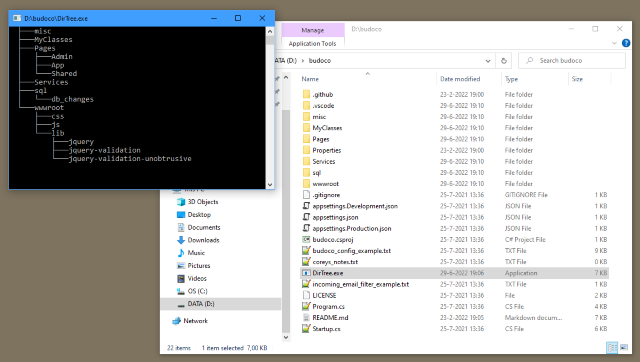This is a quick and dirty Console app written in VS2019 and .NET 4.8 to scan a VS directory and create a simplified directory tree.
Introduction
This quick and dirty Console app can be used to produce a simplified tree representation similar to the DOS Tree command, but with an option to limited the tree depth.
Directories starting with '.' are excluded, and also other directories like bin and obj.
Below is an example tree from the open-source Budoco VS Code solution (Bug Tracker in ASP.NET Core available on GitHub).

Using the Code
Command line usage:
DirTree [path] [depth]
If no path is given, the current directory is used.
Depth must be >= 0, default value is 2.
So without further ado, here is the source code:
using System;
using System.Collections.Generic;
using System.Diagnostics;
using System.IO;
using System.Linq;
using System.Text;
namespace DirTree
{
class Program
{
static string filter = "*.*";
static string startPath;
static List<string> excludeList = new List<string>();
static int folderLevel;
static int treeDepth = 2;
static int folderLevelStart;
static string lastFolder;
static bool lastDirFlag;
static int tabSize = 3;
static StringBuilder sbTree;
static void Main(string[] args)
{
if (args.Length > 0)
{
startPath = args[0];
if (args.Length > 1)
{
treeDepth = int.Parse(args[1]);
}
}
if (string.IsNullOrEmpty(startPath))
{
startPath = Environment.CurrentDirectory;
}
if (!startPath.EndsWith(@"\"))
{
startPath += @"\";
}
sbTree = new StringBuilder(50);
sbTree.AppendLine(startPath);
sbTree.AppendLine();
excludeList.Add("bin");
excludeList.Add("obj");
excludeList.Add("x64");
excludeList.Add("x86");
excludeList.Add("Properties");
folderLevelStart = startPath.Count(x => x == '\\');
var dirs = GetFoldersFiltered(startPath, filter);
if (dirs.Length > 0)
{
lastFolder = dirs[dirs.Length - 1];
ScanFolders(startPath);
}
else
{
Console.WriteLine("No directories found.");
}
Console.ReadKey();
}
static string[] GetFoldersFiltered(string path, string filter)
{
var folders = Directory.GetDirectories(path, filter).ToList();
for (int i = folders.Count - 1; i >= 0; i--)
{
string dirFullname = folders[i];
string dirname = dirFullname.Replace(path, "");
if (dirname.StartsWith(".") || excludeList.Contains(dirname))
{
folders.RemoveAt(i);
}
}
return folders.ToArray();
}
static void ScanFolders(string path, int continueLine = -1,
string previous_indent = "")
{
int i = 0;
if (!path.EndsWith(@"\"))
{
path += @"\";
}
var dirs = GetFoldersFiltered(path, filter);
int lastNode = dirs.Length - 1;
while (i < dirs.Length)
{
string dirFullname = dirs[i];
string dirname = dirFullname.Replace(path, "");
string indent = " ";
string indent2 = string.Empty;
if (dirFullname.StartsWith(lastFolder))
{
lastDirFlag = true;
}
folderLevel = dirFullname.Count(x => x == '\\') - folderLevelStart;
for (int j = 0; j < folderLevel; j++)
{
if (lastDirFlag && continueLine >= j)
{
indent += " " + new string(' ', tabSize);
}
else
{
indent += "│" + new string(' ', tabSize);
}
}
if (previous_indent.Length > 0)
{
indent = previous_indent + indent.Substring(previous_indent.Length);
}
if (i == lastNode)
{
indent2 = "└" + new string('─', tabSize);
continueLine = folderLevel;
}
else
{
indent2 = "├" + new string('─', tabSize);
}
Console.WriteLine($"{indent}{indent2}{dirname}");
sbTree.AppendLine($"{indent}{indent2}{dirname}");
if (folderLevel < treeDepth)
{
if (i == lastNode)
{
indent += " " + new string(' ', tabSize);
}
ScanFolders(dirFullname, continueLine, indent);
}
i++;
}
}
}
}
History
- 29th June, 2022: Initial version
